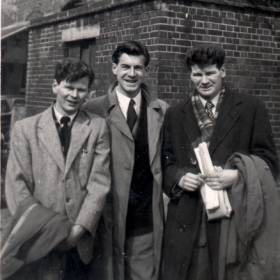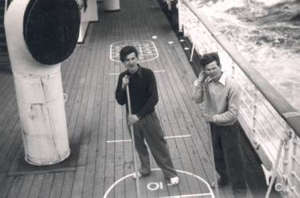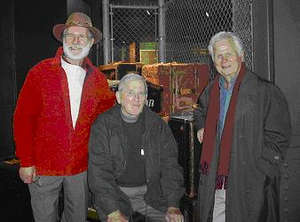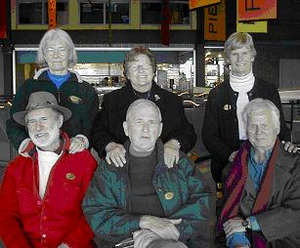Sobey Wall of Honour
Column
66
Row
6
In the 1950s if you were a young British man looking for employment Canada wanted you. If you happened to be bright, handsome it didn't hurt either. The four young men who stepped off the Scythia on March 29, 1953 were all of these things and more. Fifty years to the day of their arrival at Pier 21 the three surviving members of that dashing quartet returned to Halifax to commemorate their arrival and celebrate their half a century long friendship.
Robert Hutchings and the Tinker brothers, David and Michael, came from the same village in England. They set out together looking for adventure and the opportunities that Canada promised. Aboard the Scythia they met a kindred spirit in Leonard Read. All four men had completed their National Service and were ready for the next stage in their lives. The four passed the journey playing shuffleboard, throwing darts wildly during storms, and indulging in better food than they had seen since their childhoods before the war.
When they arrived Halifax was fogbound and thus their ship spent two days cruising around the mouth of the Harbour. The boys didn't mind at all because the food was still good and most of the passengers were young. Among the fellow travelers that they recall was a young structural engineer that had been sponsored by Avro to come to Canada and work on the Avro Arrow project. When asked about shipboard romances, Leonard Read, with a telling twinkle in his eye, murmured, "We were shy English bachelors."
Of his first impressions of Canada Robert Hutchings noted, "everything was bigger". Cars and trains seemed to eclipse their British counterparts. This was reinforced for him on the occasion of his first return trip to England; at which time he thought that everything looked small.
It was his first glimpse of Canadians in Canada that Leonard Read recalled. He described the cold March morning when they docked and, "the stevedores huddled in doorways looking diminutive and frail, not at all like the full red-blooded Canadian soldiers" that he remembered from the war?
The shy bachelors were processed through Immigration and all boarded a train bound for Toronto and the good jobs that the staff at Canada House had told them about. Leonard Read's business was plastics but first he fulfilled his obligation under the Government Assisted Passage Loan program and worked on a farm in Bolton, Ontario. This completed it was back to plastics and there couldn't have been a better time. Plexiglas, developed by the military during the war, was for the first time available to the civil market and Mr. Read found a job right away with the company that was given sole Canadian distribution rights to the miracle plastic.
Robert Hutchings was a watchmaker and jewelry designer. He had his pick of three jobs on his first day in Toronto, where fine jewelry was beginning to gain popularity. Like Mr. Read his industry was at the beginning of a boom. The Tinker brothers were not so lucky.
David and Michael were engine fitters; each had apprenticed for seven years in England and been told by the optimistic souls at Canada House that they would walk right into jobs, but in 1953 Canadian industry was in a slump. David Tinker hadn't been a terribly happy engine fitter and says that having to go into another field was one of the best things that could have happened to him.
A friend of Robert Hutchings in England had given him the phone number of his brother, a doctor in Toronto. He had told him to say hello or to call on him if any sort of assistance was needed, and so the newly arrived foursome made the call and turned up on his doorstep. He inquired about how they were all getting on employment-wise and when he found out that the Tinker brothers were still unemployed he suggested that they apply at the Imperial Bank of Canada. He conducted the physicals of their staff and thought banking might suit the English boys. It was good advice and David and Michael were both promptly given jobs. David said, "I didn't know a debit from a credit." He learned fast enough when, on his first day, they handed him a box with one hundred thousand dollars in it and told him that he was now a savings account teller.
Robert Hutchings was the first to leave Toronto and the first to marry. He and his wife still call Ottawa home. Leonard Read and David Tinker remained in Toronto; both married. Michael Tinker went to Huntington, Quebec. Although the friends separated geographically they all attended each other's weddings and remained close. A mutual love of sports was only one of the ties that bound them. The boys from Britain and their brides have done their part for Canada and ensured their legacy with a total of thirteen children and 26 grandchildren between them. The trio who visited Pier 21 were reluctant to speak of their successes, but their wives assured me that each man had done very well and that they all have interesting, successful, and happy lives in Canada. Juliet Hutching told me that over the years Robert has won many international awards for his jewelry designs including the prestigious Diamonds International, sponsored by De Beers.
Michael Tinker returned to England in 1978. Sadly, he passed away in France just last year. He was here with us though; in the photographs, the stories and the thoughts of his brother and friends as they spent their anniversary in the restored shed.
The formerly shy, formerly bachelor, still quite British trio explored the exhibit, watched the film and told wonderful accounts of their lives in Canada, many of which (the best ones) ended with one of the men saying, "don't write that down". After indulging my endless questions the boys were off to the brewery. Their beautiful wives were on their arms as they emerged from the shed for the second time in fifty years. All three said, "We have no idea where the time has gone."
In the late spring of 2003 four plaques will be installed on the Sobey Wall of Honour at Pier 21.The names Robert Hutchings, Leonard K. Read, David Tinker and Michael Tinker will be together forever. As for the friends themselves, they will not soon be forgotten by the staff and visitors that were lucky enough to spend time with them. And I, for myself, find it difficult to believe that these three charmers had ever been shy.



